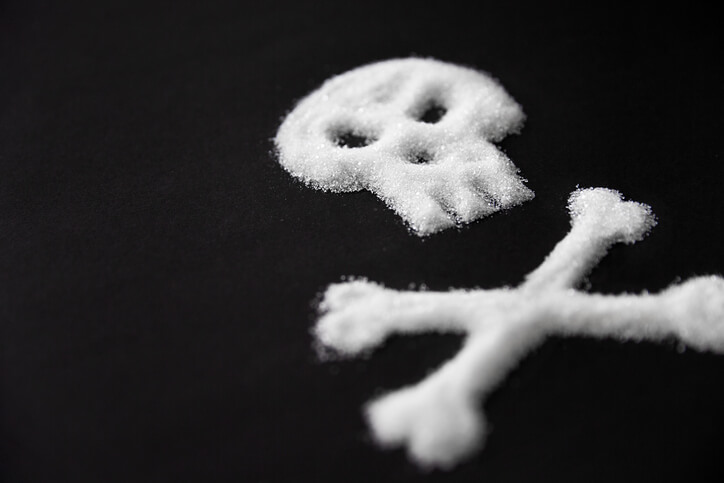We’d Like To Substitute Some Harsh Truths About Your Artificial Sweeteners
7 years ago | Nutrition
By Joy Stephenson-Laws, JD, Founder
For many, artificial sweeteners, like Splenda and Equal, seem heaven sent when it comes to satisfying that sweet craving without the extra calories. But if your gut tells you artificial sweeteners are too good to be true, your gut might be correct - seriously!
Recently, a group of researchers found that artificial sweeteners may have a toxic effect on a beneficial strain of bacteria that lives in our guts.
This is not the first time people in the health and medical field have found evidence of this issue. Check out this report from 2015.
But what’s particularly striking about this more recent research is the wide variety of artificial sweeteners involved.
If you recall, there are actually trillions of microbes that live in our guts. And these bugs play a crucial role in maintaining overall health (especially as it relates to the immune system). There is even evidence that gut microbes may play a role in whether we feel depressed or not. Furthermore, having a healthy gut microbiome helps our bodies absorb essential nutrients, like magnesium and vitamin C, from the foods we eat. And your body needs to be able to properly utilize nutrients (like vitamins and minerals) in order to be as healthy as possible.
So clearly you don’t want to destroy these friendly bugs. Researchers found that the following six artificial sweeteners exhibited toxic effects on gut bacteria:
- Aspartame (brand names include Equal and NutraSweet)
- Sucralose (Splenda)
- Saccharin (Sweet N’ Low)
- Neotame (Newtame)
- Advantame (no brand name yet, one of the newer ones on the market)
- Acesulfame potassium-k (Sweet One)
In addition to this, researchers found 10 sports supplements that contained some of these artificial sweeteners (which means that these supplements may have toxic effects on gut bacteria as well).
And if you think, ‘As long as I consume these sweeteners in moderation, it will be Ok,’ think again.
Remember, artificial sweeteners are used in many food products and soft drinks with reduced sugar content. And many people consume this added ingredient without even knowing that they contain these sweeteners.
According to one report, “The bacteria found in the digestive system became toxic when exposed to concentrations of only one mg./ml. of the artificial sweeteners.”
There are also additional reasons why artificial sweeteners may be detrimental to your health.
One report from the National Institutes of Health (NIH) pretty much sums it up:
“Consumption of artificial sweeteners has been linked with adverse effects such as cancer, weight gain, metabolic disorders, type-2 diabetes and alteration of gut microbiota activity.”
According to another recent report regarding a separate study, “[R]esearchers found that three weeks of exposure to aspartame and acesulfame potassium -- two artificial sweeteners frequently combined in products such as Equal -- altered the expression of certain genes responsible for lipid metabolism in the cells of both rats and humans.”
There is also evidence linking sweeteners and diet soda to potential cardiovascular problems.
To add insult to injury, artificial sweeteners may make you crave more sugar. And if you give in to these strong cravings, you may eventually have weight issues.
“Animal studies suggest that artificial sweeteners may be addictive. In studies of rats who were exposed to cocaine, then given a choice between intravenous cocaine or oral saccharine, most chose saccharin,” according to Harvard Health.
How Can You Be Proactive?
You obviously may want to avoid adding Equal or Splenda to your iced tea or morning cup of coffee.
As mentioned, many people consume artificial sweeteners without even knowing it.
So you almost have to be what I like to call a ‘food detective.’ Check out this very informative article about 24 foods that artificial sweeteners are hiding in. One of them is Pedialyte, a product that’s supposed to replenish a child’s body with nutrients if the child is suffering from vomiting and diarrhea. But it may have the opposite effect since artificial sweeteners may negatively impact nutrient absorption.
Ideally, you should stay away from processed, packaged foods as much as possible. But get into the habit of reading food labels.
If you are at the grocery store and see one of the artificial sweeteners discussed as an ingredient, consider leaving it on the shelf. Think about an alternative to that product. For example, many store bought tomato sauces and salad dressings contain artificial sweeteners. So make your own sauces and dressings from scratch with fresh, whole ingredients when possible. It may be extra work, but it’s worth it. Not only will you be helping protect your gut microbiome but you will also be getting healthy fats and nutrients from using ingredients like olive oil, fresh tomatoes, black pepper, garlic, and basil.
What about Stevia?
It’s always advisable to speak with a competent healthcare professional about what foods you are including in your diet, but stevia, a natural sugar and sweetener substitute, may be a viable option for you. Honey, in moderation, is also a great way to sweeten things and may provide a number of health benefits.
Enjoy your healthy life!
The pH professional health care team includes recognized experts from a variety of health care and related disciplines, including physicians, attorneys, nutritionists, nurses and certified fitness instructors. This team also includes the members of the pH Medical Advisory Board, which constantly monitors all pH programs, products and services. To learn more about the pH Medical Advisory Board, click here.







